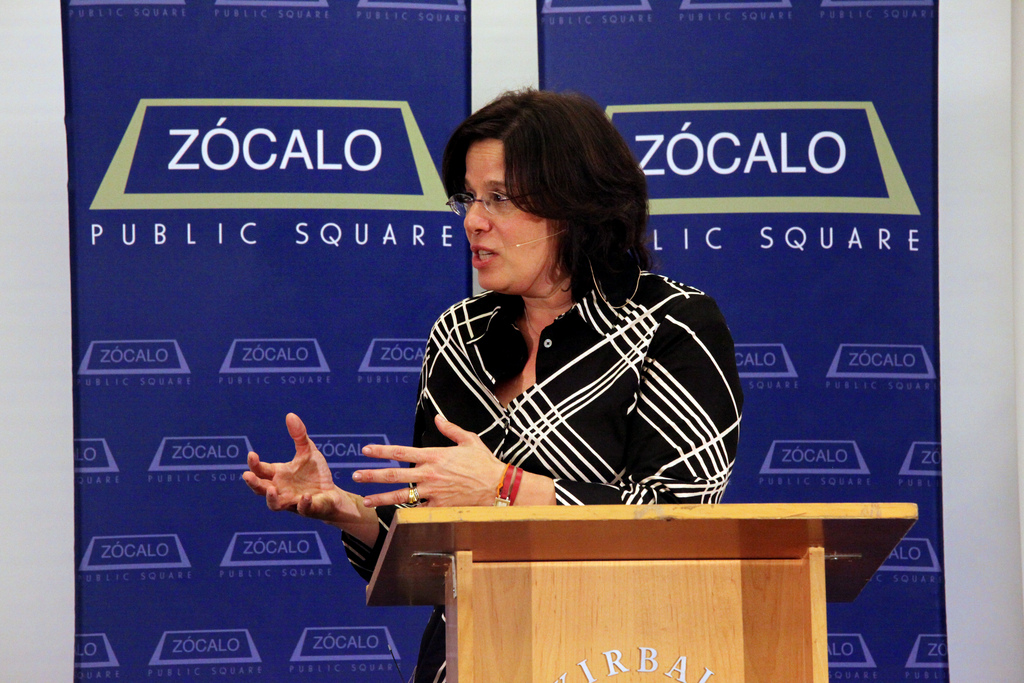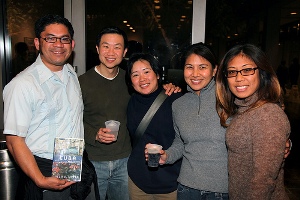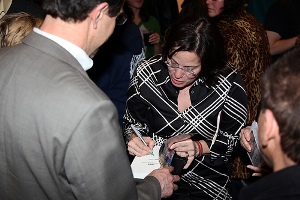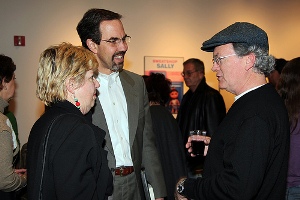
Two years to the day since Raul Castro took office in Cuba – replacing his long-ruling and then-ailing brother Fidel – Julia Sweig visited Zócalo at the Skirball Cultural Center to talk about changes in the country and its relations with the U.S.
“Your timing, Zócalo, is excellent,” Sweig said.
Focusing on recent history, Sweig explained the changes Raul Castro’s leadership initiated, the roadblocks his reforms encountered, and where Cuba stands today.
Thirty-four minutes
In the summer of 2006, Fidel Castro, suffering a severe intestinal illness, announced he would step aside and hand provisional power to his brother Raul. Soon afterward, Raul began to build consensus on reforms among the leadership and to encourage Cubans to speak more freely about their grievances. Though Fidel recovered – quite a feat, Sweig noted, to be “83 and to find himself not governing, not living on the adrenaline of the last 50 years” – Raul remained in charge. He launched his rule with a 34-minute inauguration speech. “In contrast to the several-hour speeches of his brother,” Sweig said, it was “right out of the box refreshing.” Raul, she said, “sounded more like Margaret Thatcher than Karl Marx,” emphasizing efficiency and productivity. He encouraged agrarian reform, allowed Cubans to have cell phones for the first time, and opened to Cubans foreign hotels generally reserved for tourists. And, Sweig said, “He hinted at privatization, without using that word.”
 Underlying all these changes, Sweig said, are Cuba’s still “very very impressive marks” on indicators like infant mortality, maternal mortality, life expectancy, and education. Though political and civil liberties are restricted, the number of political prisoners has declined from thousands to 200. And over the last few decades, Sweig noted, Cuba has gone from being outside the mainstream international system to helping foment revolution in Latin and Central America, having diplomatic ties to most every country in the U.N. General Assembly, and hosting “a parade of heads of state,” including from Russia and China. “Cuba’s critique of American power came to be shared globally,” Sweig said of the Bush era, “and so Cuba gained many friends, with the exception of the United States.”
Underlying all these changes, Sweig said, are Cuba’s still “very very impressive marks” on indicators like infant mortality, maternal mortality, life expectancy, and education. Though political and civil liberties are restricted, the number of political prisoners has declined from thousands to 200. And over the last few decades, Sweig noted, Cuba has gone from being outside the mainstream international system to helping foment revolution in Latin and Central America, having diplomatic ties to most every country in the U.N. General Assembly, and hosting “a parade of heads of state,” including from Russia and China. “Cuba’s critique of American power came to be shared globally,” Sweig said of the Bush era, “and so Cuba gained many friends, with the exception of the United States.”
From Elian to Juanes
The U.S. elections occurring as Raul took power raised more hopes for change in Cuba. The Bush administration’s Cuba policy was characterized by cutting back cultural ties and emphasis on regime change – and which even nixed the twice-annual immigration talks the countries had been in the habit of having since 1994. The Bush administration also “very explicitly, almost verbatim” talked about interrupting succession between the Castro brothers, but the country managed a stable and quick handover. The Bush administration also cut informal cultural ties so much that, Sweig said, “had there been chaotic upheaval, the U.S. would’ve been left at sixes and sevens without a fresh Rolodex of individuals to call on the island.”
Barack Obama, on the other hand, “hinted and made overtures toward a new Cuba policy.” Obama was able to do this in part because of the changing demographics and political preferences of Cuban Americans, whose voting power in Florida and campaign finance contributions have long framed U.S.-Cuba policy. But, as Sweig noted, “We have seen in the last several years, from Elian Gonzales to the concert by Juanes in the fall this year, a real shift.” Since 1994, 400,000 Cubans have moved to the U.S. They’re less political than the first generation of immigrants, are becoming more American than Cuban, and have broader policy interests, Sweig said. Because of their influence, Obama was able to carry 35% of the Cuban American vote – the same percentage Bill Clinton captured on a very different platform of cracking down on Fidel.
Crises, Congress, and controversy
 The reforms didn’t go as planned , in part because of major external crises. Raul made his financial calculations based on continued high growth, but Cuba suffered food and fuel crises, followed by three hurricanes that wiped out 10 percent of Cuba’s GDP. Then came the global financial crisis.
The reforms didn’t go as planned , in part because of major external crises. Raul made his financial calculations based on continued high growth, but Cuba suffered food and fuel crises, followed by three hurricanes that wiped out 10 percent of Cuba’s GDP. Then came the global financial crisis.
Obama was slow to follow through on reform, Sweig said. He attended a summit with Latin American and Caribbean leaders – who took the “virtually unanimous position,” whether left, right, or center, that the U.S. should “drop this obsession with Cuba.” Obama allowed American telecom carriers to enter Cuba and put into place some diplomatic mechanisms, “but there it stopped.” And though the policy may still evolve, and though the Honduras coup “petrified policymakers from doing the right thing,” Sweig said, on Cuba “the Obama administration is more Bush than Obama.” And though “Congress holds most of the cards” and a new bill has proposed lifting the travel ban, the bill is unlikely to pass. Cuban American representatives in Congress “have dug their heels in even more,” signaling their power to direct campaign finance and votes away from would-be reformers.
Complicating matters are some recent events. The first, Sweig said, is the arrest of an American, Alan Gross, who was working to develop civil society and promote democracy and was accused of being a spy. The policy review Obama promised, Sweig said, “is being forced by [this] very unfortunate decision by the Cuban government.” Second, a Cuban dissident died recently after an 11-week hunger strike. Raul Castro characterized it as the U.S.’s fault. Finally, after a recent bilateral diplomatic meeting between the countries, Sweig noted in Q&A, Americans met with Cuban dissidents, which “created havoc” for the Cuban government. Though dissident opinions can be found in the official government the meeting represented “an ugly and awful game that’s going on.” Sweig noted that she “did not imagine that with Fidel Castro no longer in power and with Barack Obama in office, the two countries would have come to this moment of profound discord and irrationality.”
Oil! And time.
 Some developments could change the situation, Sweig said, and the first is oil. Cuba believes it sits on significant oil resources in its offshore waters, and has solicited bids from state and private companies from around the world to explore and drill. It has not, however, solicited bids for waters closest to the U.S. “I think this this is a strategic decision,” Sweig said, “to entice American energy companies to make the case” for opening Cuba.
Some developments could change the situation, Sweig said, and the first is oil. Cuba believes it sits on significant oil resources in its offshore waters, and has solicited bids from state and private companies from around the world to explore and drill. It has not, however, solicited bids for waters closest to the U.S. “I think this this is a strategic decision,” Sweig said, “to entice American energy companies to make the case” for opening Cuba.
The other is time, although, Sweig said, “it’s uncomfortable to think about or talk about in polite company.” Fidel is 83; Raul is 78 and expected to serve only one five-year term. Cuba’s cultural life is rich; its advocacy of gender rights expansive; and its problems with race increasingly in the open. Sixty percent of Cuba’s population was born after 1959. “Although the embargo hurts,” Sweig said, given these realities, “it is no longer possible to blame most of Cuba’s problems on the U.S.” Still, Sweig said in Q&A, despite the “natural simpatico” between Cuba and the U.S., the post-Raul path is unclear particularly with purges of younger leaders, the reform process may take decades yet, and Cuba won’t quickly become a multiparty democracy: “I don’t see that coming any time soon.”
Watch the video here.
See more photos here.
Buy the book here.
Read Julia Sweig’s In The Green Room Q&A here.
*Photos by Aaron Salcido.




Send A Letter To the Editors